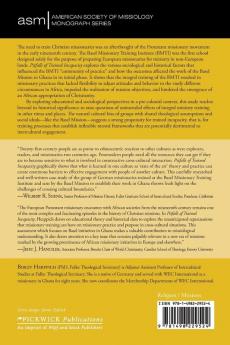English
Paperback
₹4224
(All inclusive*)
Delivery Options
Please enter pincode to check delivery time.
*COD & Shipping Charges may apply on certain items.
Review final details at checkout.
Looking to place a bulk order? SUBMIT DETAILS
About The Book
Description
Author
The need to train Christian missionaries was an afterthought of the Protestant missionary movement in the early nineteenth century. The Basel Missionary Training Institute (BMTI) was the first school designed solely for the purpose of preparing European missionaries for ministry in non-European lands. Pitfalls of Trained Incapacity explores the various sociological and historical factors that influenced the BMTI community of practice and how the outcomes affected the work of the Basel Mission in Ghana in its initial phase. It shows that the integral training of the BMTI resulted in missionary practices that lacked flexibility to adjust attitudes and behavior to the vastly different circumstances in Africa impeded the realization of mission objectives and hindered the emergence of an African appropriation of Christianity. By exploring educational and sociological perspectives in a precolonial context this study reaches beyond its historical significance to raise questions of unintended effects of integral ministry training in other times and places. The natural cultural bias of groups with shared theological assumptions and social ideals--like the Basel Mission--suggests a strong propensity for trained incapacity that is for training processes that establish inflexible mental frameworks that are potentially detrimental to intercultural engagement. Twenty-first-century people are as prone to ethnocentric reaction to other cultures as were explorers traders and missionaries two centuries ago. Postmodern people need all the resources they can get if they are to become sensitive to what is involved in constructive cross-cultural interaction. Pitfalls of Trained Incapacity graphically shows that what is learned in one culture as state of the art theory and practice can create enormous barriers to effective engagement with people of another culture. This carefully researched and well-written case study of the group of German missionaries trained at the Basel Missionary Training Institute and sent by the Basel Mission to establish their work in Ghana throws fresh light on the challenges of crossing cultural boundaries. --Wilbert R. Shenk Senior Professor of Mission History School of Intercultural Studies Fuller Theological Seminary The European Protestant missionary encounter with African societies from the nineteenth century remains one of the most complex and fascinating episodes in the history of Christian missions. In Pitfalls of Trained Incapacity Herppich draws on educational theory and historical data to explore the unanticipated repercussions that missionary training can have on missionary practice and purpose in cross-cultural situations. This assessment which focuses on Basel initiatives in Ghana makes a valuable contribution to missiological understanding. It also draws attention to a key issue that remains palpably relevant in a new era of missions marked by the growing prominence of African missionary initiatives in Europe and elsewhere. --Jehu J. Hanciles Associate Professor Brooks Chair of World Christianity Candler School of Theology Emory University Birgit Herppich (PhD Fuller Theological Seminary) is Adjunct Assistant Professor of Intercultural Studies at Fuller Theological Seminary. She is a native of Germany and served with WEC International as a missionary in Ghana for eight years. She now coordinates the Membership Departments of WEC International.
Delivery Options
Please enter pincode to check delivery time.
*COD & Shipping Charges may apply on certain items.
Review final details at checkout.
Details
ISBN 13
9781498229524
Publication Date
-15-01-2016
Pages
-386
Weight
-522 grams
Dimensions
-152x229x20.21 mm











